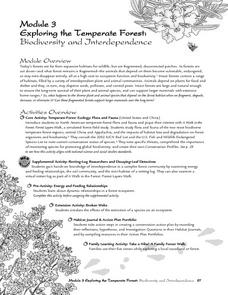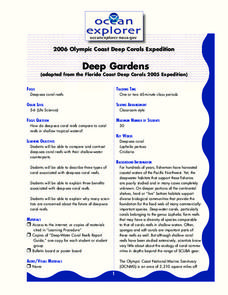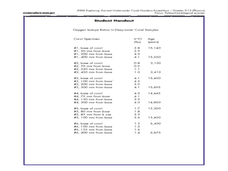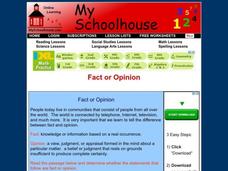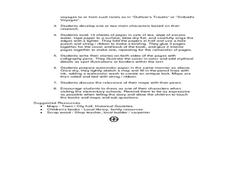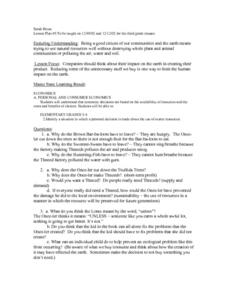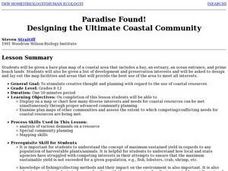Curated OER
The Biogeochemical Cycles
The majority of this presentation is a collection of diagrams and graphs that back your lecture on biogeochemical cycles. The last few slides define ecosystems and the Gaia hypothesis. You may find these slides valuable, but will...
Curated OER
Creative Problem Solving
Young scholars respond to a situation presented about the wetlands. In this wetlands lesson, students understand the various opinions over the use of areas in the wetlands. Young scholars complete a worksheet using critical thinking...
Curated OER
Treasures in Jeopardy
Students study how coral reefs can be protected from humans and their activities. In this conservation lesson students explain the benefits of coral reefs and what humans can do to help protect them.
Curated OER
Rivers Through Time
Learners read or have the book A River Ran Wild read to them. They discuss and reflect on the messages presented in the book. Students use their listening comprehension skills to draw conclusions. Learners articulate several examples of...
Curated OER
Hazardous Chemicals in Your Neighborhood
Students examine the effect of hazardous chemicals on humans. They discover how the chemicals are cleaned up and the facilities in their neighborhood. They identify federal and local agencies that oversee environmental hazards
Curated OER
Environment: Rivers of Destiny
Students investigate the results of human intervention with the Mekong. Mississippi, and Amazon rivers. After watching a video about the status of the three rivers, they complete experiments demonstrating the effects of erosion and...
Curated OER
Exploring the Temperate Forest: Biodiversity and Interdependence
Middle schoolers examine the consequences of cutting down large amounts of forests throughout the world. In groups, they use the internet to complete a module taking them on a tour through different temperate forests. To end the...
Curated OER
Dirty Mud
Students examine geological information to study benthic marine habitats. For this watershed project, students examine wetland habitats and land uses in a watershed. They will use geological information to discuss the impact of pollution...
Curated OER
Deep Gardens
Students investigate the differences and similarities between shallow-water and deep-sea coral reefs. In this coral reef lesson, students research and compare the characteristics of reefs. Students describe various lifeforms in coral...
Curated OER
How can deep-water corals be used to determine long-term patterns of climate change?
Students explore the concept of paleoclimatological proxies. In this paleoclimatological proxies lesson, students explain isotope ratios in deep water coral samples. Students write a paragraph about global climate change as it effects...
Curated OER
Keeping Watch on Coral Reefs
High schoolers investigate the dangers Coral Reefs face by investigating satellite images. In this environmental protection lesson, students utilize the Internet to discover the types of satellites and sensors used to provide...
Curated OER
Swimming With the Crabs!
In this environmental science activity, students complete a graphic organizer (Frayer model) on blue crabs. They write an article using the given facts.
Curated OER
Taming the Wild Aurochs
Sixth graders read and discuss the domestication of animals in history. In this Aurochs reading lesson, 6th graders define vocabulary and list similarities and differences between wild and domesticated animals. Students complete an...
Curated OER
Connecticut Wildlife: Biodiversity and Conservation Status of Our Vertebrate Populations
Students explore the different types of vertebrates found in their area. In this environmental science lesson, students perform a case study on the Common Raven. They analyze data collected from research and create charts and graphs.
Curated OER
Ecosystem In A Bottle
Ecosystem activities show how everyone and everything is interconnected. The smallest change can make a big impact.
Curated OER
Fact or Opinion
In this online interactive fact or opinion worksheet, students read a brief selection and respond to 10 multiple choice questions that require them to determine whether the 10 statements are facts or opinions.
Curated OER
People and the Ocean
Students view a demonstration of the ocean and what we can do to help it, and also identify seafood items that students would order on a menu. In this ocean lesson plan, students learn how people are connected to the ocean and how we can...
Curated OER
Regions of North America:The Chesapeake Bay
For this Chesapeake Bay worksheet, students read a 1-page article about the region and then respond to 5 fill in the blank and 3 short answer questions.
Curated OER
So, What's it Doing Today?
Students describe short-term variations in oceanographic parameters in the Gulf Stream. In this ocean habitats lesson students use satellite imagery to obtain information in the Gulf Stream.
Curated OER
Exploring Deep Ocean Habitats: Alien Invasion
Young scholars compare and contrast "alien species" and "invasive species."Students explain positive and negative impacts associated with introduction of non-native species, and give a specific example of species that produce t
Curated OER
The Sexton and the Compass
Students evaluate how movement patterns create and affect interdependence. They analyze the interactions within and between regions and engage in artistic inquiry, exploration, and discovery in collaboration with others. They design...
Curated OER
Economics -- Third Grade
Third graders read the Dr. Seuss book The Lorax. In groups, they answer questions that are related to economics and distribution of goods. They also identify the environmental issues present in the book and perform a skit in front of the...
Curated OER
Creating a Coastal Area
Students design and lay out a map of a coastal area that includes a bay, an estuary, an ocean entrance, and prime beach lands. They write a plan outlining solutions to the economic problems of their community and present their map and...
Curated OER
Breaking Away (Or Not...)
Students compare and contrast common reproductive strategies used by benthic invertebrates. They describe the most common reproductive strategies among benthic invertebrates on a seamount, and explain why these strategi








